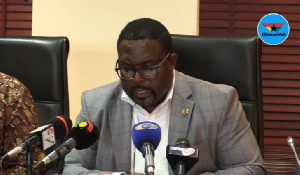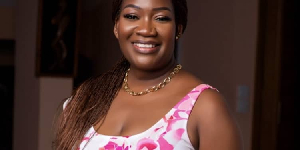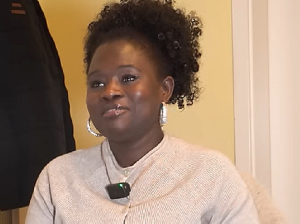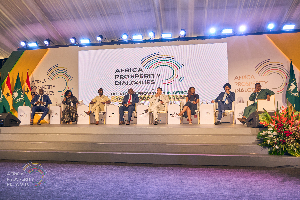A gender advocate, Comfort Darbo, has backed an appeal made by Ghana's Speaker of Parliament for government to consider increasing women participation in local governance in the country.
Professor Michael Oquaye, had called for more efforts on affirmative action to maximize the political influence of women in terms of decision making in the country.
He advocated that all the major political parties in Ghana currently controlling political affairs must gather courage and reserve quotas for women in their strong areas.
This argument advanced by the veteran politician, historian, and former Member of Parliament, has received mixed reactions from the general public.
Whilst many Ghanaians including Comfort Darbo agree with him and are therefore standing by the lawyer cum Reverend Minister, others believe women who are capable should fight and gain recognition in order to rub shoulders with their male counterparts in local governance instead of asking for quota.
Others who disagree rather said the quota system, currently applicable in Rwanda, must be adopted immediately by the administration of President Akufo-Addo and applied judiciously in Ghana.
Yussif Alhassan Karim, an engineer in Takoradi who has worked with various organizations in the country said women are capable of standing shoulder to shoulder with men in any field of endeavor.
"I worked with very strong women, and i can attest to the fact that women are capable, just that many of them like their comfort zones and therefore wouldn't struggle for positions, but honestly they are capable, and when given opportunity can do something", she revealed.
Abena Amankwa Yeboah, one of the traders in Takoradi selling clothes and rubbing shoulders with men in business, said gender equality is never going to materialize in local governance without the assistance of men.
She noted that "In all aspects of business, we require the able assistance of our men to stand up. In governance, it is the same, women will always require the support of men to succeed, therefore the 30% quota is welcomed".
Opening the 2019 edition of the annual New Year School and Conference at the University of Ghana recently, the Speaker of Parliament urged government to reserve 30% of its appointments into local assemblies for women.
“Political parties must also have quotas for women in this regard, and as for the district assemblies, the one-third of member reserved for the president at any given time, will now be reserved for women only,” he said.
Speaking in an interview, the Assembly Woman for Tepa Dwaaho in Ahafo Ano North Municipality in Ashanti Region Comfort Darbo, threw her weight behind the call made, explaining that "Ghana’s Parliament is still far off from the 30 percent mark set by the United Nations for women representation.
Ghana has made some marginal progress in recent times, with the 2016 election increasing the number of elected women from 30, representing 10.9 percent, in 2012, to 37, representing 13.5 percent.
She said "In 2000, the representation of women in parliament was 9.5 percent, 10.8 percent in 2004 and 9.3 percent in 2006.
As of June 2017, only two countries had been noted to have 50 percent or more women in parliament in single or lower houses: Rwanda with 61.3 per cent, and Bolivia with 53.1 percent"
Comfort Darbo said though she stands firmly by the position espoused by the Speaker of Parliament, previous promises made by political figures, political parties, ended up in vein because of lack of commitment.
She said there are documents including women manifesto, political party manifestos, international conventions such as Beijin conference, among others, that never got any adequate backing from men who could engineer implementation of these affirmation action plans.
Enumerating drawbacks hitherto affecting active women participation in local governance, she said house keeping challenges such as chores, marriage, pregnancy, kids, continue to hinder progress of capable women.
She condemned men who often accuse women in responsible positions of government of using their bodies to acquire them.
Minority leaders position on quota system
Last year December, the Minority Leader, Haruna Iddrisu, advocated for the number of seats in Ghana’s parliament to be increased from 275 to 300, with a reserved number of 25 seats for women.
According to him, the extra 25 seats should reflect the size and strength of the political parties in Parliament, and will help encourage women empowerment in the country.
Women’s rights organization, Women in Law and Development in Africa (WILDAF), welcomed the call by the Minority leader, Haruna Iddrissu for an additional 25 parliamentary seats to be reserved solely for women.
Currently, there are 37 women MPs in Ghana’s parliament but local government and gender advocates believe, this is insufficient and require an affirmation action.
Inadequacies at local level
Government has announced that there would be referendum in September this year to justify whether Ghanaians want Metropolitan, Municipal and District Chief Executives (MMDCE's) elected or prefer current practice of the aforementioned executive being appointed by the President and confirmed at local assembly level.
This follows the manifesto commitment made by the current administration to improve local participation in governance through the assembly elections, but that would certainly require an endorsement by Ghanaians through the refrendum.
Unfortunately, many of the electorates feel that there is disparity at the local level where decisions actually affect the nerves of community development.
This disparity, they noted has never been factored into development
with emphasis on women not been factored into decision making, therefore not making them active participants in local governance.
Many Metropolitan, Municipal and District Assemblies operate with just few women been Assembly Members. Out of these number, majority are government appointees.
At the Unit Committee level, men are always considered the favourites during elections, therefore making women inactive participants fighting to be included in decision making.
These anomalies, gender advocates say is affecting local governance, communities and development in general.
General News of Sunday, 20 January 2019
Source: Daniel Kaku
Comfort Darbo, others back 30% quota for women in local governance
 Comfort Darbo is a gender advocate
Comfort Darbo is a gender advocate
Opinions















